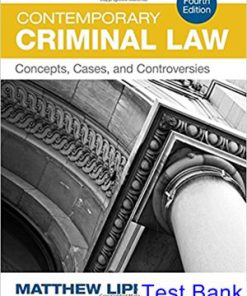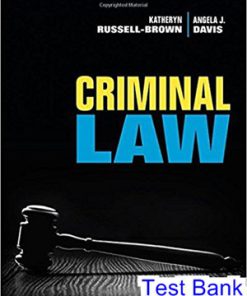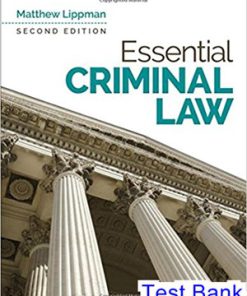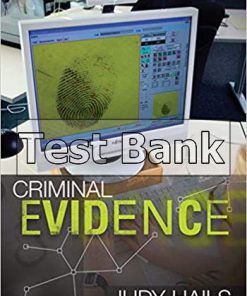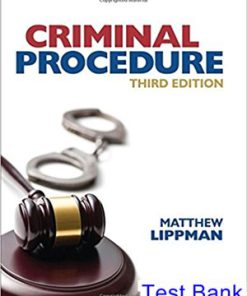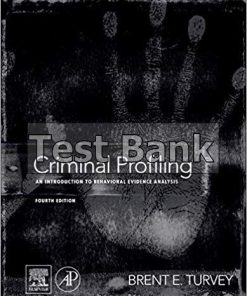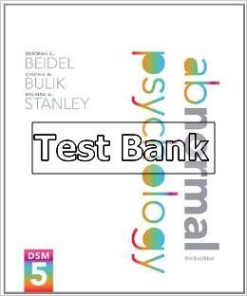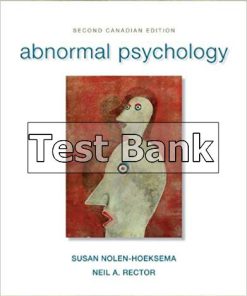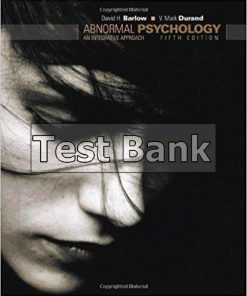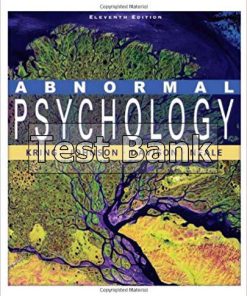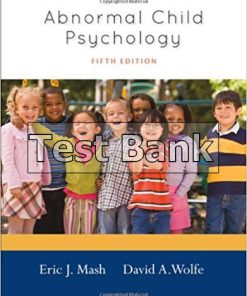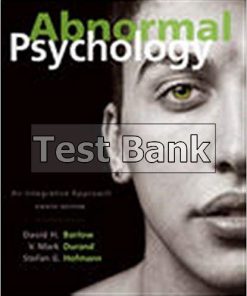Criminal Evidence 1st Edition Lippman Test Bank
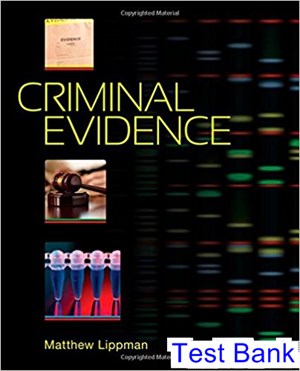
Product details:
- ISBN-10 : 1483359557
- ISBN-13 : 978-1483359557
- Author: Matthew Lippman
A concise and comprehensive introduction to the law of evidence, Criminal Evidence takes an active learning approach to help readers apply evidence law to real-life cases. Bestselling author Matthew Lippman, a professor of criminal law and criminal procedure for over 25 years, creates an engaging and accessible experience for students from a public policy perspective through a multitude of contemporary examples and factual case scenarios that illustrate the application of the law of evidence. Highlighting the theme of a balancing of interests in the law of evidence, readers are asked to apply a more critical examination of the use of evidence in the judicial system. The structure of the criminal justice system and coverage of the criminal investigative process is also introduced to readers.
Table contents:
CHAPTER 1: Introduction
Burden of Proof
The Judge and the Jury
The Development of the Law of Evidence
The United States Constitution
The United States Supreme Court
Federal District Courts and Courts of Appeal
State Constitutions and State Courts
State Judicial Systems
Precedent
The Development of Due Process
The Fourteenth Amendment
Fundamental Fairness
Total Incorporation
Selective Incorporation
Rules of Evidence
Do We Need Rules of Evidence
CHAPTER 2: The Criminal Justice Process
The Criminal Complaint
First Appearance
Preliminary Hearing
Grand Jury
Arraignment
Suppression Hearings And Pretrial Motions
Discovery
Plea Bargaining
Jury Selection
The Trial
The Judicial Sentencing Process
Sentencing Guidelines and the Rule of the Jury in Sentencing
Criminal Appeals
Habeas Corpus
CHAPTER 3: Types of Evidence
Relevance
Competence
Exclusion of Relevant Evidence Based on Prejudice and Other Concerns
Direct and Circumstantial Evidence
Testimonial and Real Evidence
Substitutes for Evidence
Stipulations
Judicial Notice
Presumptions
Presumptions and Criminal Law
CHAPTER 4: Direct and Circumstancial Evidence
Jury Decision-Making
Circumstantial Evidence of Ability to Commit the Crime
Circumstantial Evidence of an Inference of Consciousness of Guilt and of Guilt
Circumstantial Evidence That an Individual Is the Victim of Rape
Character Evidence
Other Acts Evidence
Other Acts Evidence and Circumstantial Evidence of Identification
Other Acts Evidence and Circumstantial Evidence of Intent
CHAPTER 5: Witnesses
Competency Hearings
Hypnosis
Child Testimony
Judges as Witnesses
Jurors as Witnesses
Spousal Competence
Religion
Mental Incapacity
Impeachment
Bias
Prior Felony Convictions
Crimes Involving a Dishonest Act or False Statement
Character for Truthfulness
Uncharged Crimes and Immoral Acts
Prior Inconsistent Statements
Specific Contradiction
Physical and Psychological Incapacity
Rehabilitation
Corroboration
Recorded Recollection
CHAPTER 6: Witnesses: The Opinion Rule and Expert Testimony
Unavailable Witnesses
Opinion Rule
Lay Witnesses
Expert Testimony
Qualifying an Expert Witness
Testimony on Ultimate Issues
Scope of Expert Testimony
Court-Appointed Experts
Case Analysis
CHAPTER 7: Crime Scene Evidence and Experiments
Crime Scene Evidence
Chain of Custody
Scientific Evidence
Laying the Foundation for Scientific Evidence
Right to Defense Experts
Judicially Accepted Scientific Tests
Other Judicially Recognized Tests
Tests Not Accepted by the Courts
Experiments
CHAPTER 8: Documentary Evidence, Models, Maps, and Diagrams
Authentication of Documents
Methods of Authenticating Documents
Self-Authenticating Documents
Visual Images
Authentication of Objects
Authentication of Voice Communication
The Best Evidence Rule
Application of the Best Evidence Rule
Models, Maps, Diagrams, and Charts
In-Court Exhibitions
CHAPTER 9: Hearsay
The Development of the Rule Against Hearsay
The Definition of Hearsay
The Reasons for the Hearsay Rule
Hearsay Objections
The Sixth Amendment and Hearsay
Exceptions to the Hearsay Rule
Admission and Confessions
Prior Statements
Hearsay Exceptions When Declarant Is Not Required to Be Available
Present Sense Impression
Excited Utterance
Then-Existing Mental, Emotional, or Physical Condition
Medical Treatment-Diagnosis
Business Records
Absence of Business Records
Public Records
Vital Statistics
Unavailability of Declarant
Former Testimony
Statement Under Belief of Impending Death
Declaration Against Interest
Statement of Personal or Family History
Statement Offered Against a Party That Wrongfully Caused the Declarant’s Unavailability
Residual Exception
Hearsay Within Hearsay
CHAPTER 10: Privileges
Attorney-Client Privilege
Clergy-Penitent Privilege
Physician-Patient Privilege
Psychotherapist-Patient Privilege
Husband-Wife Privilege
Government Privileges
News Media Privilege
CHAPTER 11: The Exclusionary Rule
The Exclusionary Rule
Debating the Exclusionary Rule
Invoking the Exclusionary Rule
Exceptions to the Exclusionary Rule
CHAPTER 12: Searches and Seizure and Privacy
The Historical Background of the Fourth Amendment
Searches
Informants and Electronic Eavesdropping
Plain View
Expectation of Privacy
Open Fields
Curtilage and Aerial Surveillance
Technology and Searches and Seizures
Public Places and Private Businesses
Abandoned Property
Seizures of Persons
CHAPTER 13: Stop and Frisk
Reasonable Suspicion
Informants and Hearsay
Drug Courier Profiles
Race and Reasonable Suspicion
The Scope and Duration of Terry Stops
Stop-and-Identify Statutes
Frisks
CHAPTER 14: Probable Cause and Arrests
Arrests
Probable Cause
Reasonableness and Arrests
Probable Cause, Warrants, and the Courts
Arrests and Warrants
CHAPTER 15: Searches and Seizures of Property
Search Warrants
Warrantless Searches
Consent Searches
Probable Cause Searches of Motor Vehicles
Other Warrantless Searches
CHAPTER 16: Interrogations and Confessions
Due Process
The Right Against Self-Incrimination
Miranda v. Arizona
Sixth Amendment Right to Counsel: Police Interrogations
CHAPTER 17: Eyewitness Identification
The Psychology of Identifications
The Sixth Amendment and Eyewitness Identifications
The Sixth Amendment and Critical Stages Of Criminal Prosecution
The Sixth Amendment and Prearraignment Identifications
The Sixth Amendment and Photographic Displays
The Due Process Test
Suggestiveness, Reliability and the Totality of Cricumstances
The Requirement of Police Involvement
People also search:
criminal minds 1st episode
criminal minds 1×14
dna evidence 1st used in a crime
a criminal case example
criminal investigation exam 1 quizlet
Instant download after Payment is complete


